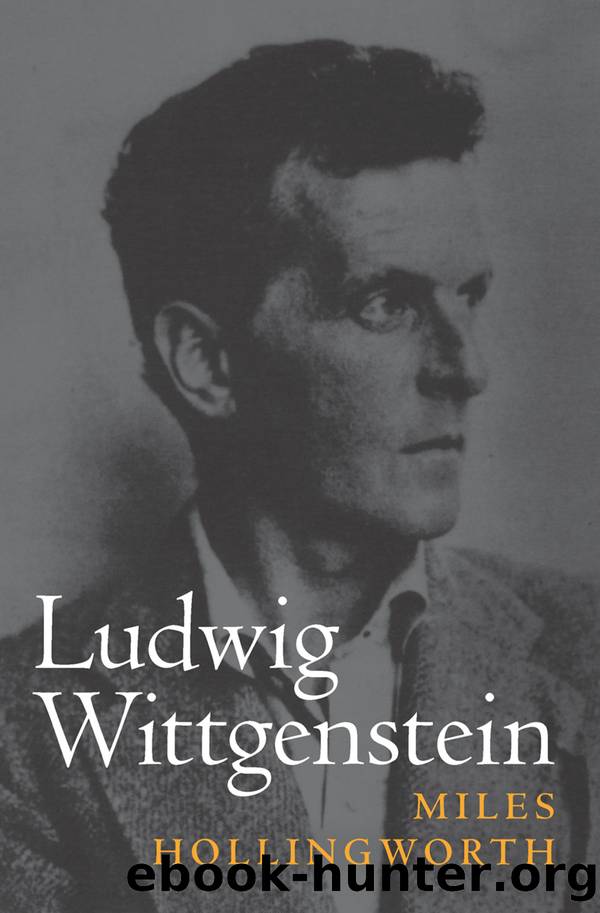Ludwig Wittgenstein by Miles Hollingworth;

Author:Miles Hollingworth;
Language: eng
Format: epub
Publisher: OUP Premium
Published: 2018-06-15T00:00:00+00:00
The Tractatus is a spiritual autobiography. If Augustineâs Confessions was the first spiritual autobiography in the known West, and if it made its point by abandoning conventional narrative at exactly the point where Augustine ceded active control of his life to God, and from then on spoke only of existential and metaphysical things, then the Tractatus takes this radicalism to a whole new level. A level at which all conventional God-language becomes clumsy, redundant, and discarded. Because if you followed God in your muscles, blood, and bonesâand if you followed him to real places in which you had real experiencesâyou wouldnât need to talk about him like that, would you? You wouldnât need to learn beliefs and dogmas like alphabets and words. And you wouldnât need to join them up to make a religion and a catechesis. Because, of course, a language is exactly what any learnt religion is, except that its objects canât even be seen. What would you expect to see if Wittgenstein had all along been following God, footstep by footstep? Would you expect him to be talking about it and using God-language all the time? Well then you have been mistaken, I am afraid. Look instead to his physical movementsâWhat he did with his feet, hands, and face. The places he put himself on the ground. And donât anymore call those his eccentricities, and relate them to his work as the random symptoms of his âtortured geniusâ. Consider them instead the note-perfect rendering of some true and truly hidden predestination. Not the predestination of the already-happened, but even that card flipped over and made into the door out of mathematical infinity and into the endless new worlds. For in truth we all have something of those worlds in usâThere is in all of us a scintilla that has always existed in that place beyond the door of mathematical infinity. Whenever they talked to us in church of Godâs eternity, there was always something in us that shuddered and recoiled from that because it wanted more.
A freely developing sequence in the first place is something empirical. It is nothing but the numbers that I write down on paper. If Weyl believes that it is a mathematical structure because I can derive a freely developing sequence from another one by means of a general law, e.g.,
m1, m2, m3 â¦
m1, m1+m3, m1+m3 â¦
then the following is to be said against it: No, this shows only that I can add numbers, but not that a freely developing sequence is an admissible mathematical concept.92
Download
This site does not store any files on its server. We only index and link to content provided by other sites. Please contact the content providers to delete copyright contents if any and email us, we'll remove relevant links or contents immediately.
The remains of the day by Kazuo Ishiguro(8358)
Tools of Titans by Timothy Ferriss(7769)
Giovanni's Room by James Baldwin(6780)
The Black Swan by Nassim Nicholas Taleb(6739)
Inner Engineering: A Yogi's Guide to Joy by Sadhguru(6424)
The Way of Zen by Alan W. Watts(6271)
Asking the Right Questions: A Guide to Critical Thinking by M. Neil Browne & Stuart M. Keeley(5338)
The Power of Now: A Guide to Spiritual Enlightenment by Eckhart Tolle(5314)
The Six Wives Of Henry VIII (WOMEN IN HISTORY) by Fraser Antonia(5213)
Astrophysics for People in a Hurry by Neil DeGrasse Tyson(4990)
12 Rules for Life by Jordan B. Peterson(4156)
Housekeeping by Marilynne Robinson(4042)
The Ethical Slut by Janet W. Hardy(4022)
Skin in the Game by Nassim Nicholas Taleb(3956)
Double Down (Diary of a Wimpy Kid Book 11) by Jeff Kinney(3902)
Ikigai by Héctor García & Francesc Miralles(3854)
The Art of Happiness by The Dalai Lama(3834)
Skin in the Game: Hidden Asymmetries in Daily Life by Nassim Nicholas Taleb(3714)
Walking by Henry David Thoreau(3672)
